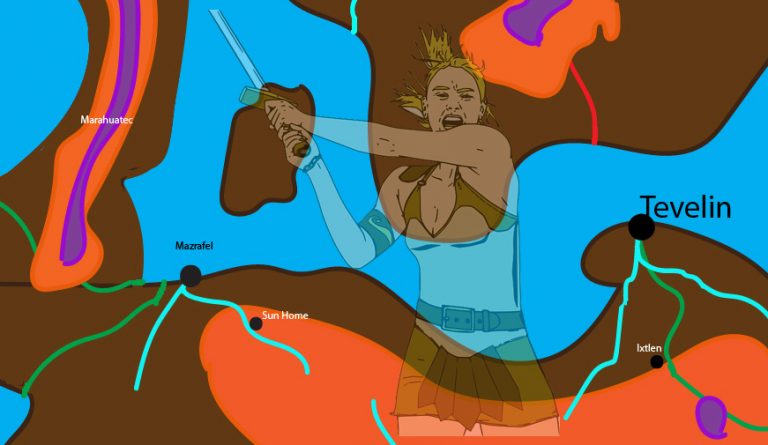Birth of a Religion
Marat, priestess of Utu, adjusted her position until she had a clear shot both at the priest of Velanac, and at the drummers who stood to either side. To her left, she could see Amrar, priest of Ra, also prepared with a short bow, not all that different from hers. She stifled a laugh. It’s probably a minute or so before midnight out in the real world above, though I can’t tell in this cave, she thought. I can barely move, my magical strength is expended, all my healing items, herbs, and other mixtures are empty. I’m bandaged around the chest, on one leg, and both arms. Pulling this bow is going to be painful. It’s a fitting end to my career.
Somewhere to her left, she knew that her colleague, no, associate Natisha was sneaking around the edge of the cavern. Just out of sight of the entrance stood the Lord Kaltros, leader of this little expedition, along with the three remaining hired guards. A few meters behind them would be Lord Mayor Zirdan, mayor of Sidroc, who was the expedition’s patron. He was lying on a stretcher after being hit by several crossbow bolts in their last encounter. It was miraculous that, without any remaining priestly healing ability in the party, he was still alive.
With everyone injured in some way, it seemed likely that this would be the end. The only surprise was the absence of guards to stop them from getting into position to attack the high priest, but she wasn’t going to complain about that. Perhaps they could at least interrupt whatever ritual he was performing before they all died in the inevitable counterattack.
She watched tensely for the moment when Natisha would be spotted. Natisha was, in her view, the expedition’s thief, present for the purpose of opening doors, seeking out tricks and traps, and scouting. Kaltros called her their “tactical specialist,” a title Marat was sure was designed to allow him to imagine he had not hired a common thief. Any moment now there would be a shout, and it would be her job to put an arrow through the high priest, with Amrar as backup.
Suddenly she saw movement directly behind the priest, inside his shrine. She saw Natisha bringing her sword down from above the priests head, but at the same time she noticed that his body was already cut in half, presumably from an upswing. The thief had made it all the way into the shrine and attacked the priest from behind. Marat released just as Natisha’s sword descended, taking the drummer on her right. Amrar’s arrow left a couple of seconds later, and took the guard on the left. At least their agreement was still working. In the absence of a previously chosen target, he worked left and she worked right.
The drumming, stopped. Both shots were apparently fatal, almost certainly indicating that the drummers had not been armored, and perhaps had not been warriors at all. She and Amrar were reasonably good archers, but not that good. As the silence fell, Marat began to hear the background sounds. There was no clash of arms, no battle shouts. Instead she heard cries of terror, weaping, and confusion. She pulled herself further along the ledge and looked down. There would be no counterattack. Gather in the center of the room were the women and children of the cavern community, including in their ranks Kal, Half-Kal, Tlazil, and even an Avim child or two. There wasn’t a warrior left. Though the women of the Half-Kal, Avim, and Tlazil fought, and indeed they had met a number of them on their way in, the ones that were left were either old, wounded, or simply not qualified to fight.
Two guards went back to fetch the mayor, and then all gathered in the cavern. After some checking, they became certain that this was, indeed, the end of the road. The Temple of Velanac, and the community that supported it were now destroyed.
“Oh well,” said Natisha, “Not much sport but I guess we need to finish the job.” She drew her sword.
Phrases flashed through Marat’s mind. Father to the widow and the orphan. Help for the helpless. Sees everything. Avenges the poor. “Stop!” she said.
Natisha looked amused, rather than angry. “I suppose you want them for your vermin collection,” she said, combining a sneer and a sort of tolerant humor in the sound of her voice. “Vermin collection” was what Natisha called the shelter and orphanage at the temple back in Sidroc.
Natisha turned to the mayor. “What is to be done? We really haven’t wiped this community out while they’re alive. They’ll be a lot of trouble to take home, and they’ll cause trouble if we leave them.” Her tone conveyed the sense of explaining the obvious to an idiot.
The mayor turned to Kaltros and shrugged his shoulders. Amongst these people he knew his only authority was based on his office, and with this group, that could make little difference. Kaltros hesitated.
“I agree with Marat,” said Amrar. “We cannot kill them now. It would be wrong.” His voice was flat. She never could tell what he was thinking, he was so unemotional. She had thought their two religions held similar moral views, but had been unable to be certain throughout this mission. Now the first time there was a disagreement in the team he was on her side.
“You two are the ones who care, you arrange to move them safely.” Kaltros turned and started talking to the hired guards as soon as he’d said this, obviously dismissing the subject from his mind.
It was several days after they got back that Marat was called into her superior’s office in Sidroc.
“I need you to make another trip to the south and establish shrines. We have two acolytes ready for ordination as priests, and three additional acolytes we can put on independent assignment. You’ll check these villages every so often and supervise them. The villages need good moral instruction and a strong temple presence or the Velanac people will take over again.”
“What about the temples of Ra?” asked Marat.
“What about them?”
“They also plan to establish a presence. Perhaps we should cooperate, put our acolytes where their priests are, and so forth. It would provide for mutual defense, and their priests could help with the instruction.” Marat felt this suggestion was only reasonable.
“Place our acolytes under the guidance of the heathen priests of Ra?” yelled Arad. “I’m senior priest of Utu on this entire continent and we will keep this religion pure.”
“But their moral tenets are almost identical to ours!” exclaimed Marat. She knew she should have known better, but she simply couldn’t stop herself. The solution to the lack of trained priests was simply too obvious.
“You’re on probation,” said Arad decisively. He was angry now, and worried. He wanted this problem behind him and was going to have no discussion. “Begin preparations for your trip. You will follow my directions exactly in this. If you disobey me, I’ll excommunicate you.”
The words struck Marat like hammer blows. Excommunicate? There were only a couple hundred followers of their faith on this continent. She was the junior partner, but nonetheless she was a partner, her boss’s right hand. How could this seem so right to her and to wrong to her high priest?
Marat left, heading to the downtown area to purchase supplies in preparation for her trip, but her heart wasn’t in it. She had been so certain. Perhaps it was because she was a descendant of the Enzar, half Galiru and half human, but steeped in the Enzar way of thinking. Tradition was much less important to her.
“Hey! Watch where you’re going Marat! One would think you weren’t paying any attention.” Amrar’s voice was as dry as ever, but there was a slight smile playing around his lips.
“I was thinking about something else,” she said.
“How about a drink?”
They entered The Broken Lantern, a bar that catered to the middle class of Sidroc, to the extent that there was a middle class there. Marat poured out her heart to Amrar, the possibilities she had seen, and what could be done for the moral growth of this country with the sort of cooperation she was proposing.
“Why not make a cooperative temple the way the Enzar do?” suggested Amrar.
“Cooperative Temple?”
“Yes, cooperative. All the priests support all the gods and learn all the rituals. Worshippers either give their allegiance to the temple itself, or to the specific god, but worship that god at the temple.”
“An ecumenical temple, the Ecumenical Temples of the Sun.” This was exciting! What couldn’t they do with this?
“You have a way with words.” Amrar was clearly pleased with the idea. “Why don’t we do it?”
“How can I? The High Priest is opposed.”
“Well, we’re using Enzar tradition to establish the temple, but our religions are both Ardenean. What’s the Ardenean tradition for dissident priests?”
“Well, you generally start a new branch of the religion.”
“Why not do that here?”
“But there are only a couple hundred of us as there is!”
“True, but first I want to ask you who has more contact with those members, you, or your High Priest?”
Marat stared at the ceiling for a couple of minutes. “I think they look to me. In fact, I teach almost all the classes for the acolytes as well.”
“So once you’re established, all of those members, acolytes, and priests will have to make a choice. At the same time, you’ll have the support of all of my temples as well. My organization is actually smaller, but combined with the portion of yours that will follow you, we’ll have the basis for a strong movement.”
Marat sat alone in the shrine of her apartment. She was already late in returning to the temple ready to leave on the expedition she’d been order to lead. She hoped her High Priest hadn’t yet noticed. The key to creating a dissident movement, she knew, was to do so before one was excommunicated. Excommunication meant starting over.
In front of her was a small altar, and in her hands were dice. Sacred dice for divination, six sides, odd numbers for no, even for yes. She set for her questions:
Can I, as a priestess, establish this new religion? [6]
Will you, my god, honor this religion with your power? [4]
Will you honor the choice of existing priests to join with the new religion? [6]
Will you accept my consecration of this shrine as the first territory of the new religion? [6]
As she asked these questions, there was a similar scene in the Sidroc Temple of Utu:
Is Marat contemplating rebellion against my authority? [4]
Can she create an independent temple if I first excommunicate her? [3]
He immediately moved to the ritual of excommunication, the particular ritual used when the target was absent. Unfortunately for him, he completed the ritual just a little late. Marat had already declared herself an independent priestess of the new Ecumenical Temples of the Sun.
Discover more from The Jevlir Caravansary
Subscribe to get the latest posts sent to your email.



